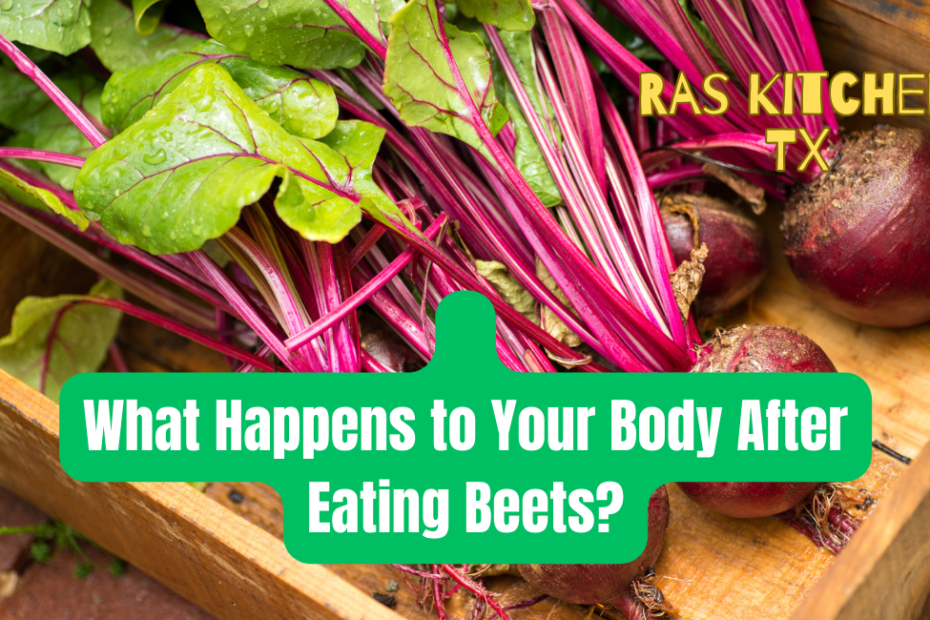Beets are earthy root vegetables in various colors, including deep red, yellow/orange, and white sugar beets. The most popular are the deep red beets, which can be found raw in the produce section, cooked in the refrigerated packaged goods section, or juiced. The root isn’t the only part of the vegetable that can be eaten; beet greens are also edible and often cooked like collard greens.
Beets, regardless of variety, have much to offer regarding health benefits. They have a high potassium, nitrate, fiber, and antioxidant content. Many experts believe they are a powerhouse for blood flow, inflammation reduction, and detoxification pathways in the body.
Please continue reading to learn more about what happens to your body when you eat beets and how to incorporate them into your diet. Also, if you’ve never liked the taste of beets, you might discover new, tasty ways to eat them!
Lower your blood pressure.
Compared to other vegetables, beets have a distinct effect on blood pressure. They are particularly effective at lowering blood pressure due to their high potassium and nitrate content. We know that a plant-based diet increases potassium and reduces blood pressure. Nitrates are also known for expanding blood vessels in the body, a process known as vasodilation, which means our hearts don’t have to work as hard to circulate blood flow.
Beetroot juice has been shown to lower blood pressure in those who consume it. This is because beetroots contain nitrates. In addition, the effect of beetroot juice on blood pressure can last up to three months after you stop drinking it. This is because beetroot juice allows more beets to be consumed in a single serving.
Promotes gut health
Beets contain fibers that support the microbiome. We now know that these fibers act as prebiotics, increasing the number and diversity of our beneficial bacteria. Indeed, some research suggests that prebiotics boost the effect of probiotics (good bacteria) on our gut health.
Beets are fantastic for gut health. They contain compounds like pectin and pectic-oligosaccharides that have been shown to benefit the gut microbiota, which means they feed the “good” bacteria. Other beet compounds, such as betalains and phenolics, may increase short-chain fatty acids in the gut. This can reduce inflammation, strengthen the intestinal barrier, and do other things. Don’t be alarmed if they turn your poop red due to betacyanin.
Natural detoxification assistance
Beets help our natural detox pathway, the liver! Despite what some nutrition supplement companies would have you believe, our liver can detoxify our bodies. That is, after all, one of its primary functions.
That is not to say that diet cannot affect liver health and detoxification. For example, we come into contact with thousands of chemicals and molecules that, if they accumulate in the body, can harm us. The liver can filter out these harmful substances, preventing them from being absorbed by the body.
The nutrient in beets responsible for increased detox pathway support is betalain. In addition, betalains promote the production of glutathione, an enzyme that aids in liver detoxification. Glutathione is a potent enzyme studied for applications ranging from anti-aging to fatty liver disease.
Reduce inflammation
Beets are high in antioxidants, which help to neutralize potentially harmful cells. In addition, it has been demonstrated that antioxidants protect against cancerous cells.
Antioxidants are abundant in colorful fruits and vegetables. Each color represents a different anti-inflammatory compound, each serving a specific purpose in the body.
In gold or orange beets, betaxanthins are a vibrant nutrient. This nutrient belongs to a larger class of antioxidants known as betalains. Betalains are known for reducing inflammation and aiding in the fight against potentially harmful oxidized cells.
Normal digestion
With nearly four grams of fiber per cup of beets, you’re well to meeting the daily fiber recommendation of 25 grams. In addition, beets contain soluble fiber, which aids in increasing bathroom frequency and preventing or managing constipation.
This is highly beneficial to digestion. More fiber is linked to better bowel habits and a lower risk of gastrointestinal disease and some cancers. Fiber also acts as a prebiotic, “feeding” the beneficial bacteria in our intestines.
Enhanced circulation
Professional athletes may brag about their beet juice after their workouts. This is because the benefits of increased circulation help bring blood flow to muscles that require repair after intense training sessions. Beet nitrates are responsible for increased blood flow and its associated benefits.
Beets contain nitrates, which are converted by the body into nitric oxide. Nitric oxide influences vasodilation (increased blood flow) and bronchodilation (easier breathing). Increased blood flow to working muscles can provide a performance advantage for athletes and active individuals. The key to reaping these benefits is to consume enough dietary nitrate, which is why concentrated forms, such as beet juice or beet shots, are consumed.
Learn more: The Best Breakfast Foods for a Flatter Stomach
